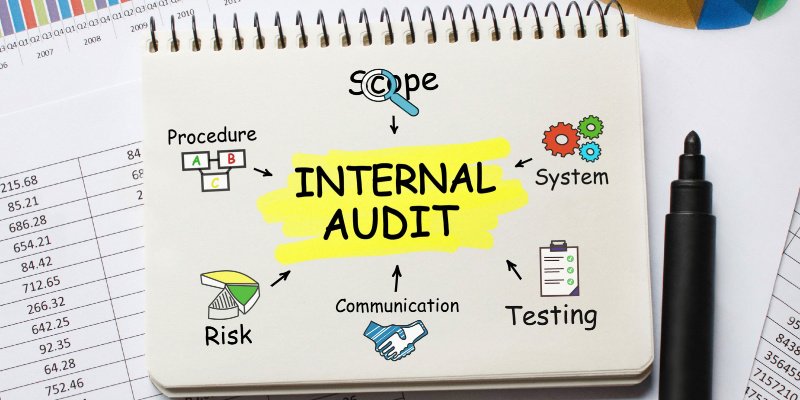
Internal auditing is a business necessity, a legislative requirement, a commercial requirement, and a need for corporate compliance. Internal auditing is an assessment of the efficiency and efficacy of internal management mechanisms to minimize risks and achieve corporate objectives. Auditors examine processes and systems from a variety of perspectives, including financial reporting risk (the dependability of financial information), process improvement areas (efficiency or effectiveness), forgery risk mitigation, information technology management (IT) procedures and guidelines (data security), and so on.
The conclusions of this evaluation are subsequently reported to an organization's management, which selects how to proceed depending on these results. The internal audit profession needs to improve its current situation due to global economic concerns and technological innovation. This blog discusses some of the difficulties and problems encountered by the internal audit role. If you want any guidance, get in touch with risk management consulting services.
Need for Risk Management Consulting Services to Conduct Internal Audit

Internal auditing is an impartial and consulting activity that adds value to an organization's operations. An internal audit can assist management in improving internal control. It aids in the identification of system flaws and offers an opportunity to correct them. Internal auditors tackle problems critical to any organization's continued existence and development.
An intern al audit handles risk and examines the efficacy of internal control system and governance in a corporation. An internal audit is performed at regular intervals to ensure that a corporation meets internal regulations and standards. Internal audit management assists the business's management in determining if something is amiss with the organization.
An Overview of Challenges Encountered by Internal Audits
Due to global economic circumstances and technical improvements, internal audit has encountered various challenges:
- Even if the regulations are simple, the government and the media have created high expectations. Internal audits do examine financial controls, but only in part.
- Internal auditors spend the majority of their time investigating what we term regulatory controls and operational controls.
- Internal audits must be able to explain their expenses and demonstrate how they directly contribute to the firm's bottom line.
- When the sector fails to do so, the internal audit division will cease to exist.
- Internal audits are a critical component of a company's risk management plan.
- They are accustomed to dealing with risk by preserving financial stability and corporate governance over financial records.
- Online privacy must be reviewed to guarantee that data is kept safe and available only for authorized personnel to who the firm's authorities have given permission.
For more than a decade, Fortius Consulting Services has provided business consulting and CFO services to companies in the UAE, Singapore, and India. Whether you are facing excessive expansion or cash-flow difficulties, we can help you navigate financial obstacles through assiduous planning. Similarly, we create advanced marketing and sales predictions to help you succeed in audits or IPOs.
Issues Encountered by the Internal Auditors of Risk Management Consulting Services
While conducting an internal audit, an internal auditor can encounter several types of issues or problems:
- The auditors may be unprepared: When the inspection dates are announced at the start of the year, they promise to be well-equipped for the audit and conduct it differently from the previous year. However, in most circumstances, as the audit dates approach, they understand that they are not properly prepared. Doing the audit for the first time is tough because they may not have appropriate papers or a checklist. Therefore, allowing time in your schedule for preparation is essential while preparing for an audit.
- Dealing with challenging auditees: In order to get the most out of the audit, the auditor must communicate with the process owner while analyzing his procedures and processes. You may encounter auditees who consistently demonstrate challenging behavior in some circumstances. They may continue to be unpleasant or uninterested in addressing your questions during the audit. In such instances, the audit must be terminated immediately, and the auditing manager, the supervisor, or the president must be notified. When the environment is tense, there is no point in conducting an audit.
- Audit report preparation and announcement- An auditor shall attempt to issue an audit report within one week of the completion of the internal audit. The auditor's report must be created in order to communicate audit results to managers so that relevant decisions can be made. An auditor should avoid creating reports using checklists since they do not display accurate information. The compilation of audits is the most time-consuming aspect of auditing because it must adhere to laws.
- Inadequate management assistance: The manager must ensure that senior management recognizes the value of auditing. The value of audit observations and the greater cost of failing to respond to them must be notified to the administration. Sometimes, superiors may not view internal audits as vital, and interest conflicts may occur. Such a circumstance should be avoided to ensure a healthy environment while executing the audit.
- A lack of professionalized and skilled auditors- Finding creative auditors with professionalized experiences who can do the internal audit effectively has proven to be difficult. This is a significant challenge in internal audits. Auditors with a versatile attitude are difficult to find nowadays; therefore, a company should always endeavor to identify one excellent internal auditor who can meet all of their demands.
- Outdated technological assets- As technology advances at a rapid pace, internal auditors must guarantee that they have the appropriate tools and technology to conduct the function. The growth of technology has led to a rise in demand for reliable auditing results and reports, and internal auditors must ensure that this demand is met. They must also be highly trained to utilize such innovations in their jobs.
Also Read : Role of Cost Contingency While Managing Project Risks
Closure
Internal audit needs to do a better job of leveraging technology, including data analytics. Internal audit departments must improve their coverage by leveraging their knowledge and technology. They should also create measures to demonstrate the benefit of the extended services. Several internal audit sectors confess that companies have difficulty finding qualified IT auditors. Contact Fortius Consulting Services, one of the best business consulting and CFO services, if you want assistance with internal audits.





